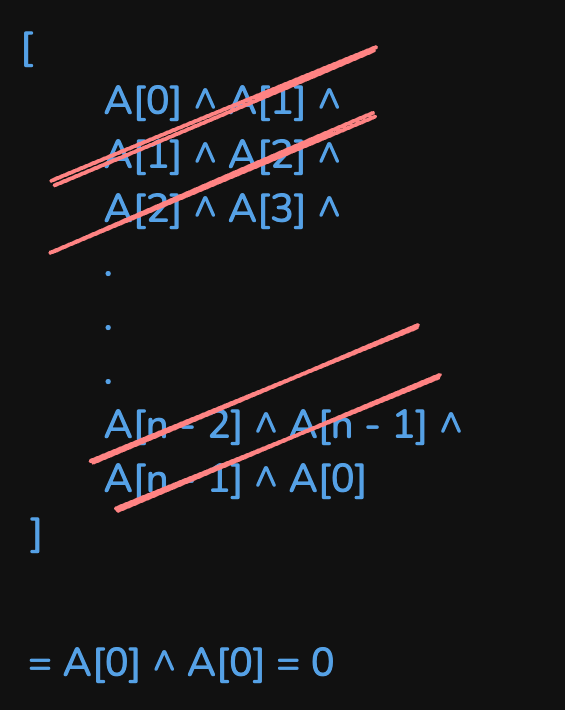Neighboring Bitwise XOR
Problem
A 0-indexed array derived with length n is derived by computing the bitwise XOR (⊕) of adjacent values in a binary array original of length n.
Specifically, for each index i in the range [0, n - 1]:
- If
i = n - 1, thenderived[i] = original[i] ⊕ original[0]. - Otherwise,
derived[i] = original[i] ⊕ original[i + 1].
Given an array derived, your task is to determine whether there exists a valid binary array original that could have formed derived.
Return true if such an array exists or false otherwise.
- A binary array is an array containing only 0's and 1's
Examples
Example 1:
Input: derived = [1,1,0]
Output: true
Explanation: A valid original array that gives derived is [0,1,0].
derived[0] = original[0] ⊕ original[1] = 0 ⊕ 1 = 1
derived[1] = original[1] ⊕ original[2] = 1 ⊕ 0 = 1
derived[2] = original[2] ⊕ original[0] = 0 ⊕ 0 = 0
Example 2:
Input: derived = [1,1]
Output: true
Explanation: A valid original array that gives derived is [0,1].
derived[0] = original[0] ⊕ original[1] = 1
derived[1] = original[1] ⊕ original[0] = 1
Example 3:
Input: derived = [1,0]
Output: false
Explanation: There is no valid original array that gives derived.
Constraints:
n == derived.length1 <= n <= 10^5- The values in
derivedare either 0 's or 1 's
Solution
Video explanation
Here is the video explaining below methods in detail. Please check it out:
<div class="youtube-embed"><iframe src="https://www.youtube.com/embed/uYpdsnlrkHc" frameborder="0" allowfullscreen></iframe></div>
Method 1 - Xor of whole of derived should be 0
Lets take original array be A[0], A[1], ... A[n-1].
Then the derived array will be:
[
A[0] ^ A[1],
A[1] ^ A[2],
A[2] ^ A[3],
.
.
.
A[n - 2] ^ A[n - 1],
A[n - 1] ^ A[0]
]
Now, we know that:
x ^ x = 0
x ^ 0 = x
So, if we perform XOR between the elements of derived, they should cancel out:

So, if xoring the derived values results in 0, we can derive this array from original array.
Code
Java
public class Solution {
public boolean doesValidArrayExist(int[] derived) {
int xor = 0;
for (int num : derived) {
xor ^= num;
}
return xor == 0;
}
}
Python
class Solution:
def doesValidArrayExist(self, derived: List[int]) -> bool:
xor: int = 0
for num in derived:
xor ^= num
return xor == 0
Complexity
- ⏰ Time complexity:
O(n)- We iterate through thederivedarray once. - 🧺 Space complexity:
O(1), We use a constant amount of extra space (variable to store XOR value).
Method 2 - Sum should be even
If the xor values of derived is 0, and derived is a binary array, then:
- Each XOR operation will essentially contribute either
0or1to thederivedarray. - For the XOR of all
derivedelements to be zero, they must pair off and cancel each other out (sincex ⊕ x = 0).
When dealing with binary elements:
- An even count of
1s ensures they can cancel each other out in pairs (every1in the XOR sequence finds another1to pair with and cancel out). - Therefore, for the
derivedarray to be valid (derived from a validoriginalarray), the sum of1s (i.e., the sum of its elements) must be even.
Code
Java
public class Solution {
public boolean doesValidArrayExist(int[] derived) {
int sum = 0;
for (int num : derived) {
sum += num;
}
return sum % 2 == 0;
}
}
Python
class Solution:
def doesValidArrayExist(self, derived: List[int]) -> bool:
return sum(derived) % 2 == 0